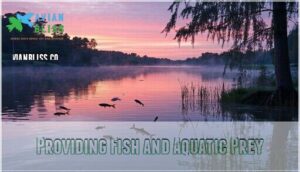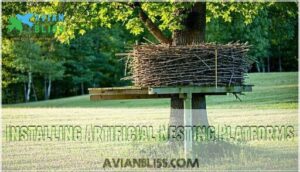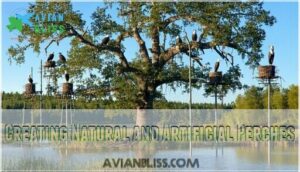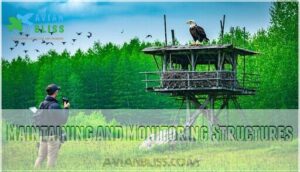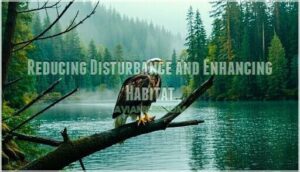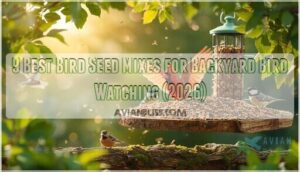This site is supported by our readers. We may earn a commission, at no cost to you, if you purchase through links.

Eagles crave clean water sources packed with fish and prefer hunting grounds where small mammals roam free.
Keep noise and human traffic low; eagles value peace as much as a good meal.
Stock your ponds with native fish and maintain healthy vegetation to fuel the food chain. It’s a balancing act—mixing wild beauty with strategic habitat tweaks.
Stick around for expert tips that’ll help you transform your property into an eagle’s paradise.
Table Of Contents
- Key Takeaways
- Creating an Eagle-Friendly Environment
- How to Attract Eagles to Your Property
- Building Nesting and Roosting Sites
- Reducing Disturbance and Enhancing Habitat
- Conservation, Partnerships, and Legal Guidelines
- Frequently Asked Questions (FAQs)
- How do you attract wild eagles?
- What is an eagles favorite food?
- What attracts bald eagles?
- What is the best time of day to see the eagles?
- Can eagles be trained to return to a specific location?
- How do weather patterns affect eagle attraction efforts?
- What impact does light pollution have on eagles?
- Are there specific plants that naturally repel eagles?
- How do nearby wind turbines influence eagle behavior?
- How do eagles interact with other bird species?
- Conclusion
Key Takeaways
- Blend tall, mature trees with open meadows near clean water to create ideal eagle habitat.
- Stock ponds with native fish and encourage small mammal populations to provide natural food sources.
- Minimize human activity and noise around nesting and hunting areas to keep eagles feeling safe.
- Build sturdy nesting platforms and follow legal guidelines to support eagle conservation and long-term attraction.
Creating an Eagle-Friendly Environment
You’ll need to replicate the specific habitat conditions that
Natural Habitat Characteristics
Eagles thrive in diverse terrain features that mirror their natural hunting grounds.
Eagles seek out landscapes with tall trees and open fields, just like their wild hunting territories
You’ll find success creating eagle habitat by combining mature forests with open rural landscapes. Forest density matters—eagles need tall trees for nesting sites but require clear sightlines for prey detection.
Cliff habitats work for golden eagles, while bald eagles prefer waterside locations.
Your eagle friendly trees should stand near open meadows.
Essential Water Sources
Within close proximity to large water bodies, eagles require river access and lake quality that supports diverse aquatic life.
Water depth should remain shallow enough for effective prey detection, while proper shoreline management maintains clear sightlines.
These essential features create the foundation to attract eagles to yard settings and establish successful eagle habitat creation.
To support eagle populations, it’s vital to understand and implement effective native species planting strategies that promote biodiversity and provide a stable food source, which is crucial for maintaining a healthy ecosystem.
Suitable Vegetation and Trees
Your property’s Tree Selection drives eagle success. Mature trees reaching 80-100 feet provide essential nesting platforms, while Native Plants support prey ecosystems that fuel eagle populations.
Key vegetation requirements include:
- Tall conifers or hardwoods for nesting sites
- Dense understory plants attracting small mammals
- Riparian vegetation supporting aquatic food sources
Effective Vegetation Management balances open hunting areas with forest cover. Forest Regeneration projects using native species create sustainable eagle habitat creation over time, establishing the foundation for long-term attraction success.
Open Spaces for Hunting
Open fields serve as essential hunting grounds where eagles can spot prey from impressive distances.
You’ll need to maintain mowed areas or natural clearings that provide unobstructed prey visibility across your foraging zones.
These scavenging areas allow eagles to detect small mammals, birds, and carrion effectively, which is crucial for creating ideal eagle feeding habits.
Position open fields strategically near eagle nesting sites to create ideal eagle feeding habits that attract eagles to property through enhanced eagle habitat preservation efforts.
How to Attract Eagles to Your Property
Success in eagle attraction depends on establishing abundant prey populations that naturally draw these apex predators to your property.
You’ll need to focus on creating food sources that mimic their natural hunting patterns while maintaining the delicate balance required for sustainable wildlife management, which is crucial for sustainable wildlife ecosystems to thrive.
Providing Fish and Aquatic Prey
Stocking your water bodies with native fish species transforms your property into an eagle feeding station.
Rainbow trout, carp, and catfish weighing 150-1000 grams provide ideal prey sizes for hunting success.
Clean, well-oxygenated water supports higher fish populations, directly increasing eagle visitation rates.
Strategic seasonal fingerling releases guarantee continuous aquatic food availability during migration periods, and effective fish food management involves using high-quality fish food suppliers to maintain a healthy ecosystem.
Attracting Small Mammals and Rodents
Beyond aquatic prey sources, terrestrial small mammals form a secondary food web that sustains eagle populations year-round.
Effective small mammal habitat creation requires strategic wildlife management approaches:
- Establish native grassland areas with mixed vegetation heights for ideal rodent control zones
- Maintain brush piles and rock formations that provide small mammal habitat while creating hunting perches
- Plant eagle attractant plants like berry-producing shrubs that draw rodents and rabbits naturally
- Create food sources through seed-producing grasses and legumes that support prey populations consistently
This prey attraction strategy builds sustainable eagle food sources without direct intervention, supporting natural backyard eagle attractors.
Offering Carrion and Scavenging Sites
Dead animal placement strategically positioned in open areas creates effective scavenging sites for eagles.
Position carrion on elevated surfaces or cleared ground where prey visibility remains high.
Fresh fish carcasses work exceptionally well as eagle attractants. Rotate placement locations weekly to prevent habituation while maintaining consistent eagle food sources throughout your property’s designated feeding zones, ensuring consistent eagle food sources and prey visibility.
Supporting The Prey Food Chain
Establishing diverse prey populations creates sustainable food sources that naturally attract eagles to your property.
You’ll want to enhance aquatic life in nearby water bodies while maintaining hunting grounds that support small mammals and birds.
This ecosystem balance approach strengthens eagle conservation efforts and creates eagle habitat that encourages long-term visitation patterns, supporting overall ecosystem balance.
Building Nesting and Roosting Sites
Creating stable nesting structures gives eagles the secure foundation they need for successful breeding and year-round roosting.
You’ll need to focus on platform strength, strategic placement, and ongoing maintenance to establish sites that eagles will actually use, which involves considering complete concepts for the eagles’ benefit.
Installing Artificial Nesting Platforms
Artificial eagle nesting platforms offer remarkable 63% success rates compared to 46% in natural nests.
Artificial nesting platforms boost eagle breeding success far beyond what natural nests can achieve
You’ll need pressure-treated boards measuring 4×4 feet minimum with proper drainage. Platform materials should include interlocked dry sticks topped with organic matter for insulation.
Installation tips require sturdy poles supporting over 100 pounds, mimicking natural nest height for ideal eagle conservation efforts. The use of ecological balance methods can substantially enhance the effectiveness of these conservation efforts with a focus on ecological balance and natural nest conditions.
Selecting Ideal Locations
Water proximity stands as your cornerstone when selecting eagle nesting platform locations.
Position structures within 500 yards of rivers, lakes, or coastal areas where fish congregate.
Choose terrain features like elevated ridges or cliff locations that provide commanding views of surrounding rural settings.
These eagle behavior patterns guarantee successful eagle nesting trees establishment while creating eagle habitat that supports natural eagle watching guides opportunities.
Creating Natural and Artificial Perches
Strategic perch placement transforms your property into an eagle’s preferred hunting ground. You’ll want to establish both natural tree selection and artificial roosting poles at varying heights to accommodate different eagle behavior patterns.
Understanding eagle perch materials is essential for creating effective habitats.
- Position perch materials 15-30 feet high – Dead snags and sturdy branches create perfect eagle watching guides
- Install roosting poles near water sources – Strategic branch arrangement maximizes hunting success rates
- Space perches 100-200 yards apart – This mimics natural eagle nesting trees distribution patterns
- Combine nest boxes with perching sites – Integrated structures help create eagle habitat more effectively
Maintaining and Monitoring Structures
Your platform’s longevity depends on regular Structure Inspection and proactive Nest Maintenance.
Check for weather damage, loose bolts, and structural integrity monthly.
Eagle Surveillance reveals behavioral patterns that guide Platform Repair timing.
Document observations to support bird conservation methods and create eagle habitat improvements.
| Maintenance Task | Frequency | Key Indicators |
|---|---|---|
| Visual inspection of eagle nesting boxes | Monthly | Cracks, loose materials, predator damage |
| Habitat Monitoring around platforms | Bi-weekly | Prey activity, vegetation changes, disturbances |
| Structural reinforcement checks | Quarterly | Bolt tightness, wood rot, platform stability |
| Eagle behavior study documentation | Ongoing | Nesting attempts, territorial displays, feeding patterns |
| Seasonal eagle behavior patterns review | Annually | Migration timing, breeding success, site fidelity |
Reducing Disturbance and Enhancing Habitat
You’ll need to minimize human activity and visual disturbances to create an environment where eagles feel secure enough to establish territory.
Strategic buffer zones and seasonal activity restrictions protect these sensitive raptors during critical nesting and feeding periods, which are complete concepts that help in understanding the need for strategic planning.
Implementing Buffer Zones
Once you’ve built eagle nesting boxes, it’s time to think about Zone Creation for Habitat Protection.
Buffer zones make a real difference. Here’s how you can set boundaries:
- Set a 200–400 meter buffer for Disturbance Mitigation.
- Maintain Wildlife Corridors for safe passage.
Use bird watching tips to monitor eagle behavior study—bird conservation methods show buffer zones boost attract definition meaning. Effective buffer zone signs, such as zone warning signs, are essential for habitat protection.
Limiting Human and Noise Disturbance
A sturdy fence can be your first line of defense for Noise Reduction and Human Buffer.
Keep foot traffic low near nesting areas.
Establish Quiet Zones for effective Disturbance Minimization.
Here’s a quick reference:
| Noise Source | Impact on Eagles | Bird Conservation Methods |
|---|---|---|
| Lawn mowers | High stress | Mow away from nests |
| Loud vehicles | Nest abandonment | Reroute traffic |
| Construction | Reduced breeding | Limit during nesting season |
| Pets barking | Fleeing behavior | Restrict pet access |
| Music/speakers | Habitat avoidance | Enforce quiet hours |
By reducing disturbances, you create an attractive influence, safeguard Wildlife Protection, and encourage eagle presence—true bird watching tips in action.
Remember, attract definition meaning goes beyond lures; it’s about minimizing threats and maximizing freedom for these powerful raptors.
Managing Visual Disruptions
After quieting your property, focus on managing visual disruptions.
Use Landscape Design and Camouflage Techniques to minimize unnatural structures and Visual Barriers that might repel eagles.
Blend feeders and nest platforms into the environment for Disturbance Minimization.
Natural features enhance attraction and interest, creating an attractive influence that draws eagles’ attention and interest—like a gravitational pull for emotional attraction, utilizing Visual Barriers to achieve this goal.
Seasonal Restrictions for Eagle Safety
Timing is everything—especially when eagle Breeding Seasons and Migration Patterns roll around.
To maximize attraction and interest, enforce Habitat Closure during nesting peaks.
Eagle Monitoring helps you spot critical periods, so adjust Safety Protocols accordingly.
Remember, emotional attraction and gravitational pull work best when you respect nature’s rhythm; following attraction theory keeps attention and interest high without causing stress or disturbance.
Understanding bird migration patterns, including celestial navigation, is essential for creating a safe and welcoming environment for eagles and other migratory birds.
Conservation, Partnerships, and Legal Guidelines
You’ll need to balance habitat restoration, legal compliance, and collaboration with wildlife experts to attract eagles responsibly.
It’s essential to follow ethical guidelines and obtain proper permits, ensuring your property supports both eagle conservation and local biodiversity.
Sustainable Land Use and Restoration
After limiting human disturbance, it’s time to harness the gravitational pull of Eco Friendly Practices.
Land Reclamation and Habitat Restoration act like a magnet, boosting gravitational attraction for eagles.
Wildlife Corridors and Sustainable Forestry create seamless pathways, mimicking natural attraction theory.
By restoring native vegetation, you generate a gravitational force that draws eagles in, ensuring your property becomes an eagle stronghold.
Collaborating With Wildlife Organizations
When you’re ready to amplify your conservation efforts, partnering with wildlife organizations is a game changer.
Tap into their expertise and resources for eagle attraction theory and habitat magnetism.
Here’s how you can get involved:
- Explore partnership models for joint research.
- Join volunteer programs for habitat restoration.
- Support community outreach and education.
- Share findings to influence emotional and gravitational attraction.
By supporting bird conservation efforts, you can make a significant impact on local ecosystems and wildlife populations.
Complying With Regulations and Permits
Traversing the legal framework of eagle attraction is no walk in the park.
Permit requirements are strict—every disturbance, nest removal, or habitat change demands regulatory compliance.
Eagle protection laws act like gravitational attraction, pulling you into environmental policies.
Think of it as physical force: documentation, monitoring, and annual reporting keep you grounded.
Emotional influence aside, always prioritize lawful attraction theory.
To guarantee compliance, it’s vital to understand the eagle protection laws and their implications on your property, considering the importance of regulatory compliance.
Ethical Wildlife Attraction Practices
If you’re serious about Responsible Tourism and Wildlife Ethics, use these five Conservation Methods for Eco Friendly eagle attraction:
- Maintain natural prey habitats.
- Avoid artificial feeding—mimic wild diets.
- Set buffer zones for nest safety.
- Monitor sites for disease and disturbance.
- Partner with agencies for Sustainable Practices.
Let Attraction Theory guide your efforts, balancing Attraction and Magnetism with ethical responsibility.
Frequently Asked Questions (FAQs)
How do you attract wild eagles?
You’ll want open fields, tall trees near water, and minimal human disturbance.
Offer natural prey by keeping grass short and avoiding chemicals.
Eagles need space and quiet—think of your land as a five-star wilderness retreat, not a city block.
What is an eagles favorite food?
Fish tops the menu for most eagles, especially bald eagles—think of them as nature’s anglers.
You’ll also see them snacking on waterfowl, rabbits, and small mammals, always preferring prey they can spot easily.
What attracts bald eagles?
Like a magnet to open water, you’ll draw bald eagles with large lakes, tall trees for nesting, and abundant fish.
Keep human activity low, offer shallow water, and maintain natural prey habitats for maximum eagle appeal.
What is the best time of day to see the eagles?
You’ll spot eagles most often in the early morning or late afternoon.
That’s when they’re on the hunt, taking advantage of thermals and good light.
So, grab your binoculars and chase the sunrise or sunset!
Can eagles be trained to return to a specific location?
Eagles can’t be trained like falcons; they’re fiercely independent and territorial.
You might tempt them back with consistent food sources and safe nesting spots, but their wild spirit means they’ll always call the shots, not you, due to their wild spirit.
How do weather patterns affect eagle attraction efforts?
Picture crisp winds sweeping across open water—those shifts in barometric pressure and temperature can boost eagle foraging.
You’ll notice more activity during mild weather; storms or extreme cold push eagles to shelter, reducing visibility and attraction, which affects their overall visibility.
What impact does light pollution have on eagles?
You’ll find that light pollution disrupts eagle hunting and nesting routines, muddling their sharp night vision.
Artificial lights can push eagles away from prime habitats, so keeping your area dark helps them thrive and feel secure.
Are there specific plants that naturally repel eagles?
Like a fortress wall, no plant species naturally repel eagles.
You won’t find botanical deterrents in your garden.
Eagles focus on prey availability and habitat, not specific vegetation, so plant choices won’t drive them away, which is related to their natural behavior of prioritizing habitat.
How do nearby wind turbines influence eagle behavior?
Wind turbines can disrupt eagle flight paths, increase collision risk, and reduce nesting nearby.
If you’re hoping for eagle sightings, turbines might turn your patch into a no-fly zone, so plan placements with wildlife in mind.
How do eagles interact with other bird species?
You’ll notice eagles dominate the skies, often outcompeting smaller birds for food and territory.
Sometimes, they’ll chase away crows or hawks, but occasionally tolerate scavengers if the pickings are good.
Eagles rarely flock with other species, and this behavior is a key aspect of their dominance, making them a notable example of eagles.
Conclusion
They say, “Success is where preparation and opportunity meet.”
By applying these five proven steps, you’ll optimize your property’s habitat and enhance your chances to observe eagles firsthand.
Integrate mature trees, open meadows, and reliable water sources, while supporting prey populations and minimizing disturbances.
Building nesting platforms and following legal guidelines guarantees sustainable attraction.
With scientific precision and technical expertise, you now know how to attract eagles and foster a thriving ecosystem right in your own backyard.
- https://www.instagram.com/p/C87mcotPIme/
- https://digitalcommons.usu.edu/context/etd/article/8717/viewcontent/2019_Hopkins_Dylan.pdf
- https://loudounwildlife.org/2023/04/bald-eagle-digestive-system/
- https://tetonraptorcenter.org/wp-content/uploads/2022/05/4_rapt-49-04-413-428_2E1.pdf
- https://www.adfg.alaska.gov/index.cfm?adfg=soundswild.episode&id=what-eagles-eat

